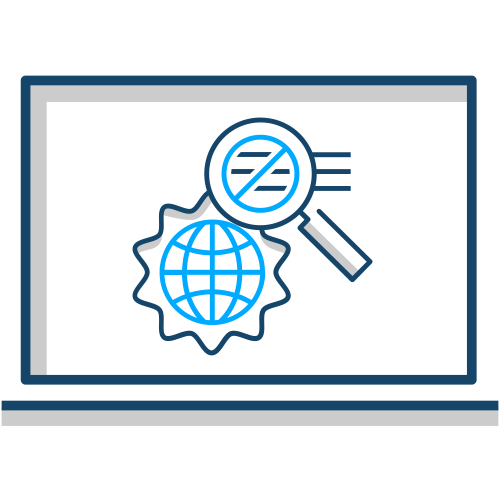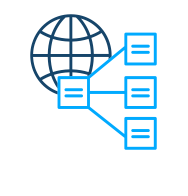We hope you find the answers to your questions below, but if not, please contact us today.
What is Denied Party Screening?
Denied Party Screening is the process of identifying whether or not any parties involved in a transaction can be found on watch lists maintained by multiple U.S. government and international agencies. It helps to ensure organizations are not conducting business with a debarred party—be it an individual or a business entity.
Depending on the methodology or screening solution used (e.g., Descartes Visual Compliance), screening for denied parties can also help to ensure organizations are not unlawfully doing business with someone located in a sanctioned or embargoed country.
To get your sanctions compliance right, check out this resource with tips on how the best denied party screening software solutions are set up.
Is denied party screening the same as restricted party screening?
Yes, for all intents, when it comes to export, trade and financial compliance—with which businesses in both the U.S. and abroad have the obligation to comply—those commonly-used terms can be considered relatively interchangeable.
Other terms common in the export compliance industry include: debarred party screening, OFAC screening, watch list screening, sanctions screening, embargoed country screening, Sanctioned Party List Screening (SPL), and Specially Designated Nationals (SDN) and Blocked Persons screening.
However, while similar in nature, there are some differences, primarily in that some terms are associated with specific regulations:
- Denied parties: having a denied party designation typically means that entity has been denied export privileges. In some circumstances, it's possible to do business with them, but if they happen to export (or reexport) what they've purchased, that's potentially an export violation in the making. End User Statements, which certify on the buyer's end that they won't export or re-export goods or materials, can be an effective way to manage risk when dealing with denied parties.
- Restricted parties: these are individuals or entities upon which restrictions—either whole or partial—have been placed. For example, they are prohibited from receiving some items subject to the Export Administration Regulations (EAR), or a license is required in order to conduct business with them. In other cases, it may be prohibited to transact with them altogether. A restricted party is sometimes referred to as a blocked party or entity.
- Debarred parties: these are individuals or organizations that have been blocked on account of a violation of the Arms Export Control Act administered by the Directorate of Defense Trade Controls.
- OFAC-related parties: these parties have been blocked as a result of the enforcement of U.S. economic sanctions. Individuals and entities, as well as sanctioned and embargoed countries, fall under the purview of the Office of Foreign Assets Controls (OFAC). Some of OFAC's watch lists include Specially Designated Nationals (SDN) and Blocked Persons, Sectoral Sanctions, and Foreign Sanctions Evaders, among others.
Does our organization really need to worry about screening?
Yes. There are a number of denied party lists of individuals, entities and countries that, for a variety of reasons, the U.S. Departments of State, Commerce and Treasury, and international governmental agencies, have placed restrictions upon conducting business. U.S. regulations generally apply to U.S. exporters, while international regulations may apply to U.S. and foreign exporters doing business in those respective jurisdictions. Screening watch lists against which organizations are expected to screen include:
- Export-related restricted, denied and blocked persons lists such as the Department of Commerce Denied Persons (BIS), the Department of State Designated Terrorist Organizations, the Department of State Arms Export Control Act Debarred Parties (DDTC), and the Weapons of Mass Destruction Trade Control Designations (OFAC) lists.
- Sanctions programs-related blocked persons lists, including the U.S. Treasury Department's Specially Designated Nationals and Blocked Persons, Foreign Sanctions Evaders and Sectoral Sanctions Identifications Lists, and the United Nations Consolidated List.
- General Services Administration lists help organizations that depend on government contracts (i.e., SAM and EPLS) search multiple U.S. General Services Administration Lists of Parties to help identify those (e.g., suppliers and vendors) excluded from receiving Federal contracts.
- Law enforcement-related wanted persons lists, such as the FBI Ten Most Wanted Fugitives, FBI Most Wanted Terrorists, Department of Homeland Security Investigations Most Wanted, U.S. Immigration and Customs Enforcement and Removal Operations Most Wanted, and the U.S. Secret Service Most Wanted List, to name just a few.
- Politically Exposed Persons and Office of Inspector General Lists.
- International Terrorist, Blocked Person, Wanted, and Entity Lists, such as the European Union Consolidated List, Interpol Recently Wanted, OSFI Consolidated Lists, HM Treasury Consolidated List, and additional international lists from other countries, including Australia and Japan.
If an organization conducts business with entities on these watch lists, they are risking an export violation that could result in fines and other penalties. By making sure that to avoid doing business with anyone on a government watch list, companies are helping to protect themselves against said fines, other criminal and civil penalties, denial of export privileges, and negative media coverage.
Do governments outside the U.S. have screening lists? Are there international lists?
Yes. The U.S. is not the only country that has lists similar to those maintained by U.S. government agencies. Many foreign countries and international bodies have their own laws which require the vetting of entities, including financial sanctions lists such as the HM Treasury Consolidated and the OFSI lists. Other international lists include the European Consolidated List, Europol and Interpol lists, Canadian Economic Sanctions list, and too many others to list here.
Has anyone been found guilty of violating trade, export and OFAC regulations?
Yes. A number of companies have been fined for knowingly and unknowingly violating trade, export and financial compliance regulations. In 2018, 30 individuals and businesses were convicted; and $1,101,431,225 in fines, $9,642,496 in forfeitures, and 506 months of imprisonment were handed down by the Bureau of Industry and Security (BIS) alone. A list of recent OFAC actions can be found here.
Who should be screened?
Generally speaking, screening should be performed for every export or financial transaction, domestic and foreign. Ideally, screening should include every party involved in the transaction, including the final end user, and the chain of individuals and businesses in-between.
Screening should also be take place for any type of contact, including visitors, employees, business associates, re-sellers, etc.—though the lists screened may vary for each of these purposes. Countries where exports are destined should also be screened to ensure they are not currently facing sanctions or embargoes.
Does our organization need to screen financial transactions?
Yes. Every transaction facilitated in U.S. Dollars is processed through the U.S., and is therefore subject to OFAC regulations. Banks processing the transaction have an obligation to freeze funds from being transferred to sanctioned parties or face penalties themselves. To avoid this possibility, and a potential OFAC violation, screening is recommended.
International financial agencies also have their own lists, so screening can help avoid fines and other penalties from global regulatory and enforcement bodies.
When should screening take place?
This can vary from organization to organization. Some may choose to screen potential customers or vendors at first contact. Some screen again when orders or finances change hands, and repeat this process with each order up until the time an order is shipped. Other organizations have an automated rescreening system in place instead of rescreening manually. Visitors may be screened when they sign up for a tour, and again when they arrive.
What is really important about when screening takes place is that it should fit the regulatory goals or risk objectives, of the organization—ensuring that finances, technology, information, or goods are not transferred in violation of regulations.
How can my organization start screening for denied parties?
Simply fill out our contact form or give us a call at 877-328-7866. We will spend a few minutes getting to know about more about your organization and the export compliance challenges you face. From there, we will recommend a solution to help meet those challenges head on—or even schedule a demo so you can see Visual Compliance in action.
Also check out these 6 key features to help you evaluate and select the best denied party screening solution for your business.
How does Descartes Visual Compliance help protect organizations from violating trade, export and OFAC regulations?
Descartes Visual Compliance screening solutions check for individuals and companies that are found on U.S. and international government watch lists, as well as countries facing sanctions or under embargo. Options include:
- Online Screening for ongoing, ad-hoc screening,
- An OFAC-specific screening solution to protect against a financial compliance violation,
- Bulk screening, or scrubbing, that checks all records at once through Batch Screening,
- The ability to screen while on the go on mobile devices using Mobile Screening,
- Daily "dynamic" screening that rescreens all records daily against changes made to government watch lists, and
- Screening solutions that integrate directly into business systems, such as ERPs and CRMs, to help ensure screening takes place as a natural part of the business workflow.
How much does Descartes Visual Compliance cost?
Descartes Visual Compliance solutions are affordable and modular, giving organizations the option to add solutions they need to get compliant right now, and the ability to add complementary solutions to bolster compliance should needs ever change.
Contact us today to learn more about how one or more of our screening solutions can decrease reputational risk, increase productivity, and save any number of staff hours spent on screening for denied parties manually. Or request a quote, and get started today.
Related Products
For more information about screening software solutions
To learn more, call toll-free 1-877-328-7866 (Intl: 716-881-2590) and talk to one of our compliance consultants. They'll help you analyze your screening requirements, evaluate your options, and provide focused software demonstrations.




